 W
WGeneral Sir Archibald Alison, 2nd Baronet was a Scottish soldier who achieved high office in the British Army in the 1880s. He was a descendant of the Alison family presented by Francis Galton in Hereditary Genius (1869) as an example of genius inherited over several generations.
 W
WAdmiral Sir Lewis Bayly, was a Royal Navy officer who served during the First World War.
 W
WGeneral Sir Henry Brackenbury, was a British Army officer who was assistant to Garnet Wolseley in the 1870s and became part of his 'Ring' of loyal officers. He also wrote several books of military history and memoirs.
 W
WGeneral Sir Redvers Henry Buller, was a British Army officer and a recipient of the Victoria Cross, the highest award for gallantry in the face of the enemy that can be awarded to British and Commonwealth forces. He served as Commander-in-Chief of British Forces in South Africa during the early months of the Second Boer War and subsequently commanded the army in Natal until his return to England in November 1900.
 W
WLieutenant General Sir William Francis Butler was an Irish 19th-century British Army officer, writer, and adventurer.
 W
WSir Gilbert Thomas Carter was an administrative officer in the Royal Navy and a colonial official for the British Empire.
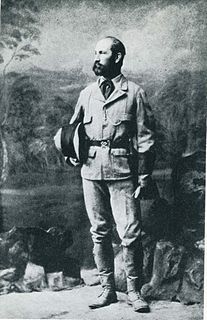 W
WMajor General Sir George Pomeroy Colley, was a British Army officer who became Governor and Commander-in-Chief of Natal and High Commissioner for South Eastern Africa. Colley was killed in action, at the Battle of Majuba Hill.
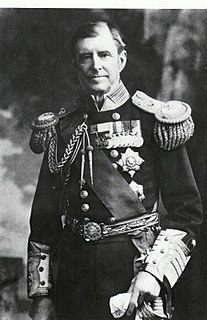 W
WAdmiral of the Fleet Sir John Edmund Commerell, was a Royal Navy officer. As a junior officer, he was present at the Battle of Vuelta de Obligado in November 1845 during the Uruguayan Civil War. He also took part in operations in Sea of Azov during the Crimean War and went ashore with the quartermaster and a seaman, to destroy large quantities of enemy forage on the shore. After a difficult and dangerous journey they reached their objective – a magazine of corn – and managed to ignite the stacks, but the guards were alerted and immediately opened fire and gave chase. The men had difficulty in escaping, but they finally reached their ship and the lookouts later reported that the forage store had burned to the ground. He and his colleague, Quartermaster William Thomas Rickard, were awarded the Victoria Cross, the highest award for gallantry in the face of the enemy that can be awarded to British and Commonwealth forces.
 W
WHenry O'Callaghan Prittie, 4th Baron Dunalley, was an Anglo-Irish peer.
 W
WMajor Francis Edward Henry Farquharson VC was a Scottish recipient of the Victoria Cross, the highest and most prestigious award for gallantry in the face of the enemy that can be awarded to British and Commonwealth forces.
 W
WMajor Edric Frederick Gifford, 3rd Baron Gifford, VC was an English recipient of the Victoria Cross, the highest and most prestigious award for gallantry in the face of the enemy that can be awarded to British and Commonwealth forces.
 W
WSir John Hawley Glover was a Royal Navy officer who served as Governor of Lagos Colony, Governor of Newfoundland, and Governor of British Leeward Islands.
 W
WLieutenant Colonel Thomas Bernard Hackett was born in Riverstown, County Tipperary and was an Irish recipient of the Victoria Cross, the highest and most prestigious award for gallantry in the face of the enemy that can be awarded to British and Commonwealth forces.
 W
WIsrael Harding VC was an English recipient of the Victoria Cross, the highest and most prestigious award for gallantry in the face of the enemy that can be awarded to British and Commonwealth forces.
 W
WSurgeon General Sir Anthony Dickson Home VC KCB was a Scottish recipient of the Victoria Cross, the highest and most prestigious award for gallantry in the face of the enemy that can be awarded to British and Commonwealth forces.
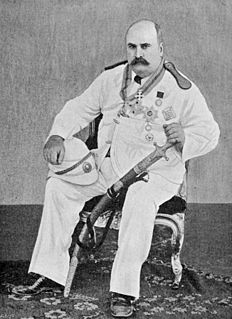 W
WSir Lloyd William Mathews, was a British naval officer, politician and abolitionist. Mathews joined the Royal Navy as a cadet at the age of 13 and progressed through the ranks to lieutenant. He was involved with the Third Anglo-Ashanti War of 1873–4, afterwards being stationed in East Africa for the suppression of the slave trade. In 1877 he was seconded from the navy to Sultan Barghash of Zanzibar in order to form a European-style army; he would remain in the employment of the government of Zanzibar for the rest of his life. His army quickly reached 6,300 men and was used in several expeditions to suppress the slave trade and rebellions against the Zanzibar government.
 W
WSamuel McGaw VC was a Scottish recipient of the Victoria Cross, the highest and most prestigious award for gallantry in the face of the enemy that can be awarded to British and Commonwealth forces.
 W
WField Marshal Paul Sanford Methuen, 3rd Baron Methuen, was a British Army officer. He served in the Third Anglo-Ashanti War in 1873 and then in the expedition of Sir Charles Warren to Bechuanaland in the mid 1880s. He took a prominent role as General Officer Commanding the 1st Division in the Second Boer War. He suffered a serious defeat at the Battle of Magersfontein, during which he failed to carry out adequate reconnaissance and accordingly his artillery bombarded the wrong place leading to the Highland Brigade taking heavy casualties. He was later captured by the Boers at Tweebosch. After the war he became General Officer Commanding-in-Chief in South Africa in 1908, Governor and Commander-in-Chief of Natal in 1910 and then Governor and Commander-in-Chief of Malta in 1915.
 W
WMajor-General Sir Luke O'Connor, was an Irish soldier who served in the British Army. He was the first soldier to receive the Victoria Cross, Britain's highest award for gallantry in the face of the enemy.
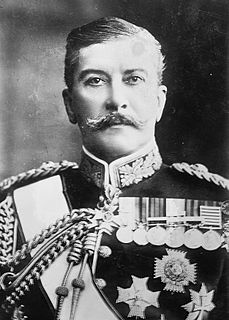 W
WGeneral Sir Arthur Henry Fitzroy Paget, was a soldier who reached the rank of General and served as Commander-in-Chief, Ireland, where he was partly responsible for the Curragh Incident.
 W
WGeneral Sir Baker Creed Russell was an Australian-born British Army officer who served with distinction in the Indian Mutiny, Anglo-Ashanti War, Anglo-Zulu War, Sekhukhune Wars, and Egyptian War
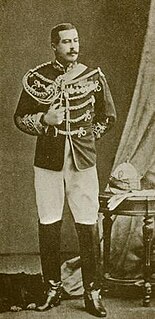 W
WMajor General Reginald William Sartorius was a recipient of the Victoria Cross, the highest and most prestigious award for gallantry in the face of the enemy that can be awarded to British and Commonwealth forces.
 W
WAdmiral Sir Percy Moreton Scott, 1st Baronet, was a British Royal Navy officer and a pioneer in modern naval gunnery. During his career he proved to be an engineer and problem solver of some considerable foresight, ingenuity and tenacity. He did not, however, endear himself to the Navy establishment for his regular outspoken criticism of the Navy's conservatism and resistance to change and this undoubtedly slowed the acceptance of his most important ideas, notably the introduction of directed firing. In spite of this, his vision proved correct most of the time and he rose to the rank of admiral and amongst other honours was made baronet, a hereditary title.
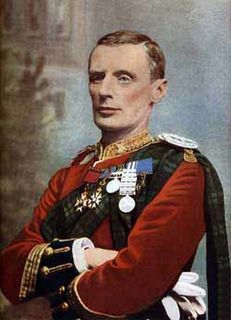 W
WMajor-General Andrew Gilbert Wauchope was a British Army officer, killed commanding a brigade at the Battle of Magersfontein in the South African War.
 W
WField Marshal Garnet Joseph Wolseley, 1st Viscount Wolseley, was an Anglo-Irish officer in the British Army. He became one of the most influential and admired British generals after a series of successes in Canada, West Africa, and Egypt, followed by a central role in modernizing the British Army in promoting efficiency. He served in Burma, the Crimean War, the Indian Mutiny, China, Canada and widely throughout Africa—including his Ashanti campaign (1873–1874) and the Nile Expedition against Mahdist Sudan in 1884–85. Wolseley served as Commander-in-Chief of the Forces from 1895 to 1900. His reputation for efficiency led to the late 19th century English phrase "everything's all Sir Garnet", meaning, "All is in order."
 W
WField Marshal Sir Henry Evelyn Wood, was a British Army officer. After an early career in the Royal Navy, Wood joined the British Army in 1855. He served in several major conflicts including the Indian Mutiny where, as a lieutenant, he was awarded the Victoria Cross, the highest award for valour in the face of the enemy that is awarded to British and Imperial forces, for rescuing a local merchant from a band of robbers who had taken their captive into the jungle, where they intended to hang him. Wood further served as a commander in several other conflicts, notably the Third Anglo-Ashanti War, the Anglo-Zulu War, the First Boer War and the Mahdist War. His service in Egypt led to his appointment as Sirdar where he reorganised the Egyptian Army. He returned to Britain to serve as General Officer Commanding-in-Chief Aldershot Command from 1889, as Quartermaster-General to the Forces from 1893 and as Adjutant General from 1897. His last appointment was as commander of 2nd Army Corps from 1901 to 1904.
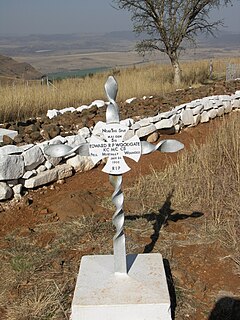 W
WMajor-General Sir Edward Robert Prevost Woodgate was an infantry officer in the British Army.